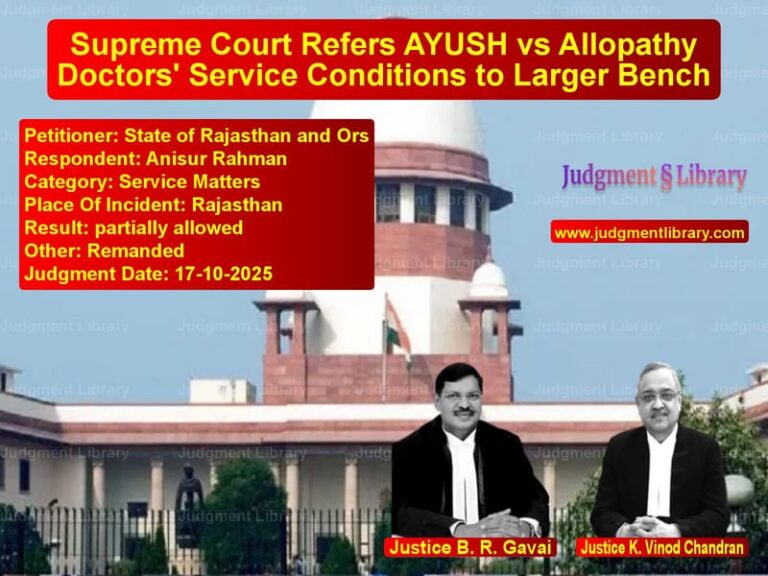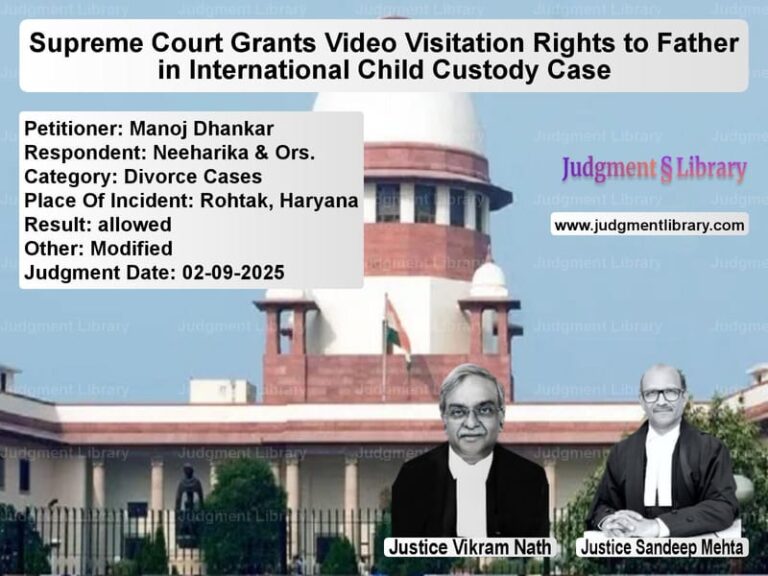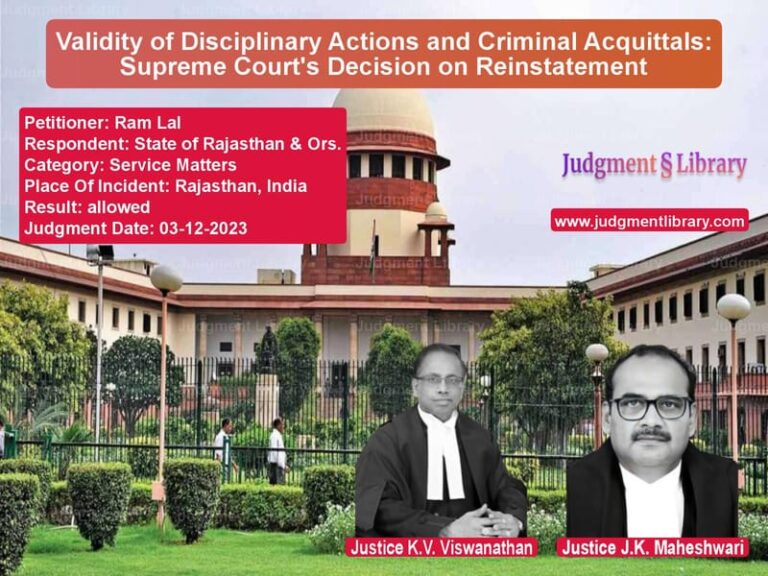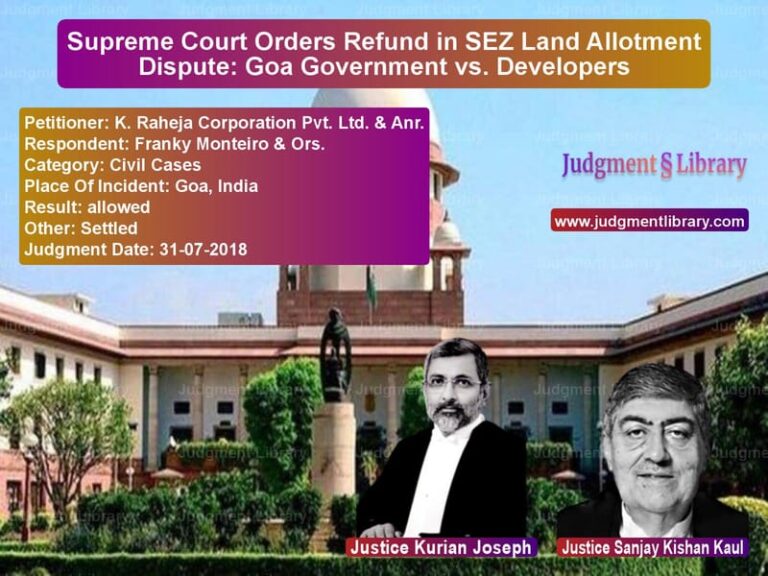Stamp Duty Dispute: Supreme Court Partially Modifies Penalty in Property Transaction Case
The Supreme Court of India, in the case of M/s MSD Real Estate LLP vs. The Collector of Stamps & Anr., addressed a significant dispute concerning the imposition of stamp duty and penalties related to property transactions. The case revolved around whether a transaction involving a trust’s property should be classified as a gift deed or another form of conveyance, determining the applicable stamp duty and penalties.
The Court partially modified the penalty imposed by the Collector of Stamps, emphasizing the importance of fair and reasonable taxation while ensuring compliance with revenue laws.
Background of the Case
The appellant, M/s MSD Real Estate LLP, purchased a property known as Lantern Hotel on Yeshwant Niwas Road, Indore, through a registered sale deed dated November 27, 2019. The property was previously owned by H.C. Dhanda Trust, which had acquired it through a Deed of Assent executed on April 21, 2005.
The dispute arose when the Collector of Stamps issued a notice claiming that the deed dated April 21, 2005, was a gift deed rather than a trust-related document. Consequently, the Collector of Stamps imposed a deficiency in stamp duty amounting to ₹1,28,09,700 and a penalty of ten times this amount, totaling ₹12,80,97,000.
The H.C. Dhanda Trust challenged this order through a writ petition before the Madhya Pradesh High Court, which dismissed the petition on March 30, 2017. The matter was further appealed to the Supreme Court.
Legal Issues and Arguments
The key legal issues in this case were:
- Whether the Deed of Assent executed by the trustees of H.C. Dhanda Trust in 2005 should be treated as a gift deed or another conveyance.
- Whether the penalty imposed by the Collector of Stamps was excessive and justified under the circumstances.
- Whether the subsequent purchaser, M/s MSD Real Estate LLP, could be held liable for the stamp duty and penalty originally imposed on the trust.
Arguments by the Petitioner (M/s MSD Real Estate LLP)
The petitioner, represented by Senior Advocate Kapil Sibal, argued:
- The transaction was not a gift deed but a trust-related transfer, and thus, a different stamp duty should have been applicable.
- The penalty of ten times the stamp duty was arbitrary, excessive, and disproportionate to the alleged deficiency.
- The subsequent purchaser (MSD Real Estate LLP) should not be forced to bear the liability of the trust’s past obligations.
- There was no fraud or willful evasion of stamp duty, warranting a more reasonable penalty.
Arguments by the Respondents (Collector of Stamps & Municipal Corporation)
The State of Madhya Pradesh, represented by Solicitor General Tushar Mehta and Advocate General Purushaindra Kaurav, countered that:
- The transaction was indeed a gift deed, making the trust liable for full stamp duty and penalty.
- The penalty was imposed as per statutory provisions and could not be waived arbitrarily.
- The subsequent purchaser (MSD Real Estate LLP) was aware of the pending stamp duty and penalty when it acquired the property.
- Allowing the petition would set a precedent for tax evasion through trusts.
Supreme Court’s Ruling
On Stamp Duty and Penalty
The Court observed that:
- The Collector of Stamps was correct in determining that stamp duty was due on the transaction.
- However, the penalty of ten times the stamp duty was excessive and disproportionate.
- Instead, the penalty should be reduced to five times the deficient stamp duty.
On Liability of the Subsequent Purchaser
The Court ruled that MSD Real Estate LLP, as the new owner, was liable to pay the pending stamp duty but could not be subjected to an unfair penalty. The Court directed:
- The total penalty should be reduced from ₹12,80,97,000 to ₹6,40,48,500.
- All payments already made by MSD Real Estate LLP should be adjusted against this new liability.
- The company was allowed to apply for building permissions without being penalized for past disputes.
Legal Principles Established
This ruling reinforces several key legal principles:
- Proportionality in Penalties: The Court emphasized that penalties must be reasonable and not excessive.
- Liability of Subsequent Purchasers: Buyers of disputed properties should be liable for actual dues but not unfairly burdened with past penalties.
- Judicial Review of Stamp Duty Assessments: Courts have the power to modify penalties imposed by revenue authorities.
Conclusion
The Supreme Court’s judgment in M/s MSD Real Estate LLP vs. The Collector of Stamps is an important decision balancing revenue interests with fairness. By reducing an excessively high penalty and ensuring compliance with tax laws, the Court reinforced principles of justice and proportionality in tax enforcement.
This ruling serves as an important precedent in stamp duty disputes, particularly those involving trusts and subsequent property purchasers, ensuring that taxation remains fair and equitable.
Petitioner Name: M/s MSD Real Estate LLP.Respondent Name: The Collector of Stamps & Anr..Judgment By: Justice Ashok Bhushan, Justice R. Subhash Reddy, Justice M.R. Shah.Place Of Incident: Indore, Madhya Pradesh.Judgment Date: 17-09-2020.
Don’t miss out on the full details! Download the complete judgment in PDF format below and gain valuable insights instantly!
Download Judgment: Ms MSD Real Estate vs The Collector of Sta Supreme Court of India Judgment Dated 17-09-2020.pdf
Direct Downlaod Judgment: Direct downlaod this Judgment
See all petitions in Property Disputes
See all petitions in Contract Disputes
See all petitions in Landlord-Tenant Disputes
See all petitions in Succession and Wills
See all petitions in Damages and Compensation
See all petitions in Judgment by Ashok Bhushan
See all petitions in Judgment by R. Subhash Reddy
See all petitions in Judgment by Mukeshkumar Rasikbhai Shah
See all petitions in partially allowed
See all petitions in Modified
See all petitions in supreme court of India judgments September 2020
See all petitions in 2020 judgments
See all posts in Civil Cases Category
See all allowed petitions in Civil Cases Category
See all Dismissed petitions in Civil Cases Category
See all partially allowed petitions in Civil Cases Category







